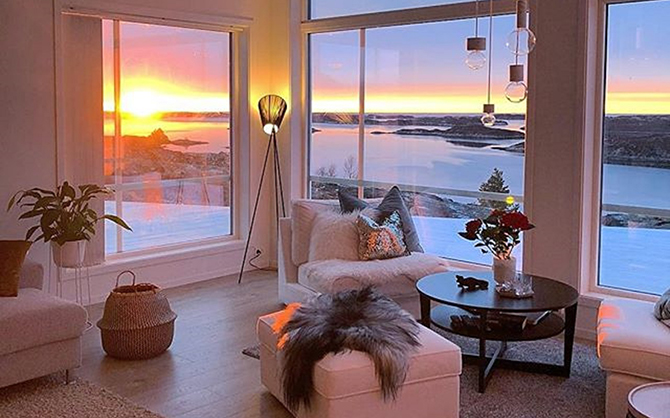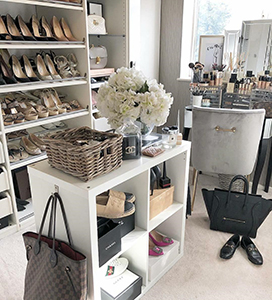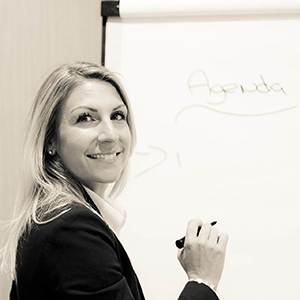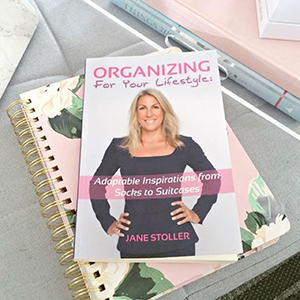THE ULTIMATE GUIDE
DECLUTTER YOUR HOME—AND LIFE

By Jane Stoller
Much of my practical organizing experience comes from living in small apartments and having to adapt to small spaces. I have lived in sixteen different apartments in eight different cities across two continents. Because I move a lot, I’m continually having to add-on, update, and modify my closet and storage spaces. But it’s not all bad, because this experience has given me some valuable insight into how to use space effectively, and find new and creative ways to make almost any closet situation work.
As more and more people move to cities and face smaller living quarters, we’re increasingly challenged to do more with less. When living in a small space, being organized becomes a central part of any quest to be successful, have time for meaningful relationships, and maintain a healthy, beautiful body and mind.
IMPROVE LIFE
You may think I’m exaggerating, but getting and staying organized will improve every aspect of your life, and smaller spaces leave less room for organizational errors. And I don’t just mean re-organizing what you already have (I’m all about organizing), but having a beautiful system of color-coded boxes with things inside you’ll never use is also a waste of space.
Getting started is usually the hardest part. But before we organize our stuff, we have to evaluate it. The first step to becoming organized is decluttering. Take a look around you. Many people believe that a lack of space is the reason they’re not organized, so they get a bigger space. However, space alone can’t save you; your behavior also has to change. When people lose sight of how much stuff they have, this can even lead to hoarding.
I’m sure you’ve heard this before, and I know you think it’s easier said than done, but decluttering your space can help make you less stressed, and more productive. To begin decluttering, you need to make some hard decisions about what items are practical and emotional necessities, and what’s just plain trash. Everyone’s definition of what is clutter and junk will differ; there are no set rules about what items fall into what category.

DOES IT FIT YOUR LIFESTYLE?
My organizing mantra: The most important thing is that the items you keep need to fit your lifestyle. If they don’t they’re better off somewhere else. Start small and give yourself a goal for each room or part of your life. Some decluttering gurus suggest tackling categories instead of rooms. For example, starting with all of your clothing, or all of your books. Regardless of where you start, if clutter surrounds you, whether it’s in a work area or a leisure area, then stress will always be lingering. If the items you are eliminating do not fall into the trash category, then I highly recommend donating them to a local thrift store, selling them online or a local consignment store.
Now let’s talk about your closet space, which is hard to come by in New York! We are always surrounded by sales/outlets/Black Friday sales etc., which makes it harder for everyone to maintain a streamlined closet. When I go to an outlet mall, for example, I suddenly become convinced that I need two of everything because it all seems like such a good deal.
In fact, many of the clothes I buy at outlet malls I never end up wearing; I only bought them because the discount seduced me. Therefore, I try to stick to this advice: “If you do not use it or need it, it’s clutter, and it needs to go.” I am also in love with apps that help me know what I have in my closet even when I am not standing in front of it. Knowing what you have and understanding your style is especially important in New York, a fashion-forward city with the newest trends and most up-to-date fashion available at your fingertips.
Creating a curated closet of items you love to wear, vs. a quick fashion trend that gets piled in the back of the closet will help manage clutter. The Curated Closet by Anuschka Rees is a great book that offers a step-by-step guide to determine your style and ensuring your clothes represent that.

PART OF EVERYDAY
Ultimately, incorporating organization into your life shouldn’t involve changing who you are, but instead maximizing it. Knowing where your favorite socks are, and having them stored correctly, means you’ll be able to wear your favorite socks more often and look better doing it. Similarly, packing correctly for a once-in-a-lifetime trip means you’ll be able to enjoy that trip even more. Remember, being organized means that you don’t have to think about organizing all the time—because you do it automatically, as an organic part of your everyday routine.
And you can only reach this level of organizing bliss by making sure your organizing systems and routines are perfectly adapted to your goals, personality, and needs. Again: organizing is a lifestyle, but it needs to be your lifestyle. To start, I would set aside time daily to organize, even if it’s just ten minutes at the beginning or end of your day. If you do this, you’ll instantly feel like you’ve achieved something. And, yes, if you continue to make organizing a daily goal, it will become a priority. Soon you’ll be organizing naturally.
ORGANIZING APPS
Here, some of my favorite apps and must-have products that help me stay organized in the home and office.
Closet+ The Swiss Army knife of all style assistants, it helps you know exactly what is in your closet. Especially great if you have more than one closet location (ie: storage lockers or another home/closet). Info: closetapp.com.
Snupps Collect, organize and share. I use this app for cosmetics but it can be used for a variety of organizing needs. Info: snupps.com.
My Purse Cache This is an all-in-one organizer. A bonus is that all the data can be downloaded to an Excel spreadsheet which includes value, brand, material, purchase date, etc. Info: mypursecache.com.
Hubspot Free CRM download that keeps emails and contacts organized. Info: hubspot.com.
Neat Organize your business. This genius app will allow you to scan and send documentation to your accounting software. Info: neat.com.

REFLECT YOUR PRIORITIES
It is my passion to help not only transform spaces with being organized but also lives. Unlike most organizing advice focusing on either organizing “things” or “processes,” I believe that if you start your day choosing clothes from a laser-focused closet, you’re well on your way. No one’s home or office needs to look magazine perfect. But these spaces should reflect that person’s priorities—the life they want.
And lastly, whether you’re single or part of a large family, whether you live in an apartment or a mansion, you need to embrace the wonders of labeling. For New Yorker’s it is even more important to incorporate these organizing basics with small spaces and busy lifestyle’s. I talk about all of these techniques and more in my book, Organizing For Your Lifestyle, which provides organizing inspiration rather than a prescription, which hopefully inspires you to get and stay more organized.
For more information on Jane Stoller, visit organizingforyourlifestyle.com.









